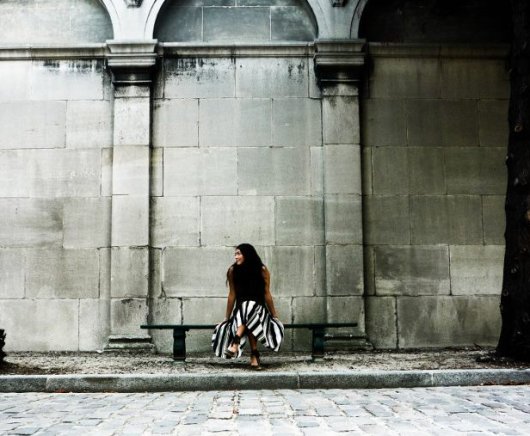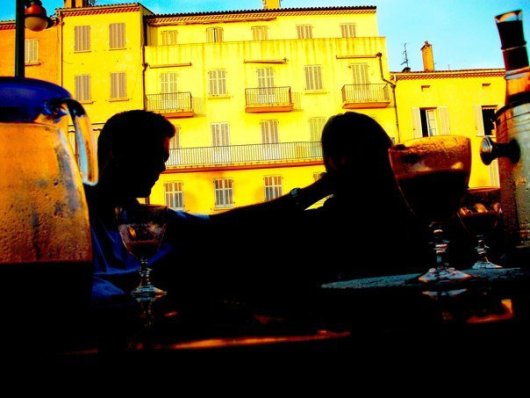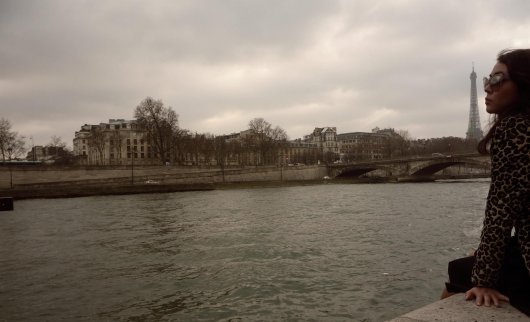
To Swim Across The World
by ARIANA ROBERTS
1
It’s Jeanne d’Arc day. Outside there is singing and marching; people flank the Rue di Rivoli bearing crosses, flowers, and a banner that says, “France is Christian and will always stay that way.”
The girl next to us is alone, has a French-Russian dictionary and looks tiny in the big pink velvet seat. You can tell she’s been crying. “I wish I could help her,” Sara says. When the waiter comes, she asks for chocolat au chaud in the smallest voice possible. There is a tan line on her finger where a ring used to be. I look at my own hand – a year later, that line is still there, like a scar. “I wonder what her story is,” Sara says. I know, but I can’t explain it to my friend.
I cover my hand with a napkin and order a Serendipity. “Good choice. I can tell you make good choices,” Colin says. A few minutes later, he hands me a drink that is not at all what I ordered. It looks innocent in the glass, but feels like a punch in the face. I’m in love.
“Let’s call this Petit Cendrillon,” he says. “Cinderella left the prince, and she lived happily ever after.”
He tells me how, centuries ago, French women in deep mourning were required to shun all public promenades. There was one street, leading away from the farther extremity of the Champs-Élysées to the Seine, where life went on for widows of the capital. Called “Allée des Veuves,” the avenue became a haven for the husbandless; there, they could drive carriages without reprisal and forget their sorrows without violating the code of Parisian society. Walking down Avenue Montaigne today, I can almost see them in the Jardin Mabille, admiring Chinese lanterns on boughs, lapping up spray from the fountains, practicing quadrilles amidst lilacs in full blossom.
Now the only lilacs are the silk ones in the windows of Dior. Inside, a little ring says “Oui” in gold script with a diamond dotting the “I.” “Toutes les filles en rêvent,” the salesgirl says.
“Non would be more fitting, for me at least. Qui trop embrasse, manqué le train.”
She laughs, picks the ring up, and slides it on my left ring finger, over a glaringly bright stripe of pale skin, brighter than the ring that covered it in the first place. It happens to fit perfectly.

2
According to Hindu theology, there are five sacred lakes collectively called Panch-Sarovar. One of those lakes, Pushkar, is where I heard this story.
Shakuntala is abandoned at birth, rescued by the sage Kanva, and raised in a hermitage. One day, the elders go on a pilgrimage, leaving her alone in the forest. The king is out hunting when he stumbles upon Shakuntala, falls in love, and marries her. He invites her to the capital, but she wants to say goodbye to Kanva first. Before leaving, he gives her a signet ring as proof of their union.
Shakuntala waits for Kanva, fantasizing about her future life as queen. She’s so busy dreaming she doesn’t realize a sage has come to the hermitage. Offended, he bewitches the king into forgetting her existence.
Eventually the elders take Shakuntala to the palace. While crossing a river en route, she carelessly loses the ring. When they reach the palace, the king doesn’t recognize Shakuntala. The elders think she is a crazy liar; feeling betrayed, they abandon her. Alone in the desert, Shakuntala nearly dies giving birth to the king’s child.

Later, a fisherman finds the ring in the belly of a fish. Upon seeing it, the king remembers his wife. He sets out to find her and encounters an army of Asuras. After defeating them, he is taken to Hindu heaven. It is years before he returns to Earth, where he meets Shakuntala and their child by chance. But Shakuntala is no longer the sheltered girl from the hermitage — she’s a legit female Ibn Battuta. Raising a child and traveling the world has made her wise and strong.
Since she won’t go back to the palace, the king asks to accompany the little family on their journey. Though she never stopped loving him, Shakuntala refuses. “Where I am going, no man can follow,” she explains sadly. When people ask how I lost my wedding ring, this is the story I tell instead.
Pushkar Lake is surrounded by ghats, a series of steps leading to the water. Thousands flock there every year, believing a dip in the lake will cleanse them of sin. It will not. I was there a month and swam every day. Every day, I came out feeling just as bad as when I went in.
3
Nearly opposite the island of Samos, Ephesus lay among the slopes of Mount Pion and Mount Koressos, on the Aegean Turkish Coast. The port was strategically located near the mouth of the Cayster, along the main trade route from Rome to the Orient. If you start a tour from the upper entrance, you are immediately rewarded with a magnificent view of the Street of the Curetes down to the Library of Celsus.
The theater where the Ephesians rioted at the instigation of Demetrius is situated within a hollow of Mt. Pion. It was decorated with pillars, niches, and fine statuary. The marble seats for the spectators were arranged in a half circle of 66 rows; these, it has been estimated, afforded room for about 25,000 persons. The acoustic properties of the theater were excellent. Even today, a word spoken in a low voice at the location of the stage can be heard throughout the theater. I know, because once Paul said, “Stay here,” and ran down to the stage. From the top seats I could hear him say, “I love Ari.”
Fragments of the temple of Artemis indicate that brilliant color and sculpture adorned the building. Large white marble tiles covered its roof. Instead of mortar, gold is reputed to have been used between the joints of marble blocks. Never had such large blocks of marble been used to create this kind of building at this magnitude. Though Heracleitus decried the temple’s dark approach to the altar, for the rest of the ancient world, it seemed as if it would never fall into decline.
In the 3rd century C.E., an earthquake effectively rent the great temple in half. Almost immediately, seafaring Goths from the Black Sea pounced, plundering the temple riches before setting it on fire. Eventually, silting sealed off the harbor, and Ephesus ceased to function as a port. No modern settlement stands on the same site today.
“One of the greatest human achievements in the world, and it barely lasted a century,” Paul said.
“I wonder why they didn’t try to rebuild it.”
“Probably embarrassed. They all put their faith in something they shouldn’t have. Nothing humans can create is lasting.” It was dusk, and we’d come without a tour group, surrounded only by columns that line the street from the theater to the city harbor. He took my hand and led me to the bottom of the street, through the arch that was the gateway to the world.

4
Follow the Theodesian Walls past Topkapi-Ulubatli and you’ll reach Sulukule, the Harlem of Istanbul. We’d gotten off at the wrong metro stop and found it accidentally, a once-vibrant center of Romani culture turned Dudley Street. The entire area was leveled by demolition crews, save a few colorful buildings — relics of the Byzantine era — in shambles. Assuming the area abandoned, we fell asleep in a purple house, the casualty of an urban redevelopment project long forgotten. When Paul woke me up in the morning, there were little kids standing over us, poking him. “People live here,” he said incredulously.
We played hide-and-seek in the ruins a few hours; then, one boy led us up to a mosque overlooking Sulukule. He spoke, and Paul translated.
“Mimar Sinan built it for Princess Mihrimah. She was in love with Sinan, but forced to marry a grand vizier. Mihrimah stayed in an unhappy marriage more than twenty years, until her husband died. Then Sinan built the mosque, to prove he still loved her. Nothing else like it would exist for centuries. It has hundreds of windows, but only one minaret. Mihrimah ordered Sinan to stop, even though she was entitled to two.”
“Why?”
“The mosque is a symbol. Of her loneliness.”
“I don’t understand. She was free, and Sinan loved her. What was the problem?"
“Mihrimah was 17 when she got married. Before that, she lived with her parents. She never had the chance to live her own life.”
“So instead of sharing her life with someone who loved her…”
“She died alone. Because that was her choice.”
“I don’t think I like this story,” I said. “It makes no sense.”
A few years later, I went back to the rubble. Sirens blared throughout Istanbul to call people to prayer. When the chanting stopped, there was a sound like rushing water coming from a small pit nearby. “Cisterns,” an old woman said. “From Constantinople.”
“Underneath us?"
“Hundreds of them.”
I stood at the edge of the dirt, gauging the cavity’s size. I could fit down there.
“You’ll ruin your dress,” she warned.
The mosque, situated on the highest hill in Istanbul, cast its shadow over us, an emblem of Sulukule’s former radiance and present decay. I thought of the wedding that was supposed to take place there. What I didn’t understand before made perfect sense now.
I smoothed some wrinkles out of my white gown and slid down the dirt hole. “Doesn’t matter,” I told her. “I’m not going to need this anyway.”
5
“Where will you go?” Paul asked.
“I don’t know. People have been asking me that all year. I never know.”
“How did you pick where you went before?”
“I sit in the airport, looking at departures. If there’s a place I’ve never heard of before, I go. If there’s a place someone told me to avoid, I go there, too.”
It was March, the first time we’d spent together since breaking up. I was too tired to drive; he was sleeping in the backseat, so I pulled over and stretched out on the roof of the car, looking up at the stars over Lake Baikal. When he got out and sat next to me, there was more light in the sky than night.
“Have you ever seen so many stars?”
“No.”
“Not even in Thimphu?”
“The clouds made them hard to see,” I said.
“You know what’s funny? You’re seeing these stars for the first time, but they’re not even there anymore. They ran out of fuel and died ages ago.” Paul turned his back to me and laid on the car, propping his head up on one elbow. “We drove all the way here to stare at a ghost.” 
When a star dies, eventually, if the supernova is large enough, it triggers the formation of new stars, but not all the time. Sometimes, pressure from outside forces causes the remnants to collapse into a black hole from which nothing can escape, not even light.
A week later, we left Russia, parting ways. Paul went to Zurich, and I went to Rason, a little seaside village in the DPRK.

7
Everything I write about my experiences represents a loss. I can tell you about the Kremlin diamond vaults and being tasered by a KGB agent and camping in a puffin colony and dinner with Leila Bekhti and partying with Stella McCartney and ziplining over Shan foothills and playing tag in a minefield and bragging about my pain tolerance to a man at the airport — perhaps you’ve heard of him — John McCain. I can tell you about eating an apple off the tree in Almaty — the riotous, visceral colors and scent of the orchard; the juice that dripped everywhere no matter how neat my bites were — but you're never going to get it unless you go there yourself.
There's a disconnect. You have to walk the beaches of Goa barefoot, then climb the steps of Sacré-Coeur in 5-inch heels to know how conflicted I am, to see how I love two worlds and waffle between them. I can describe Paul on paper, that's easy. But you can't understand how I felt when he ran after me at The Standard and kissed me outside my room and spent almost a decade with me — at our age, an eternity — who I left and lost and spent the last year trying to forget. All I can say is this: He's the reason I flit from hotel to hotel, living everywhere and nowhere, and right before I put my key in the door I always look down the hall, hoping he'll come running around the corner. He never does.
Ariana Roberts is the senior contributor to This Recording. She is a writer living in Cleveland. She last wrote in these pages about the brightest star of the north. You can find an archive of her writing on This Recording here.

"The Swan" - Camille Saint-Saëns (mp3)
"The Cuckoo In The Heart of the Woods" - Camille Saint-Saëns (mp3)
